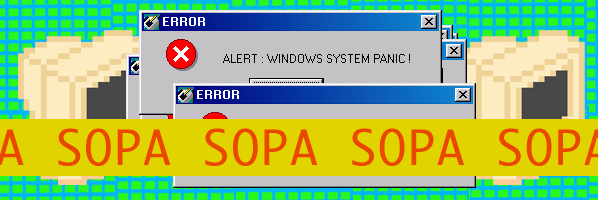
The Response to SOPA and PIPA: A Corporate Quickening of the Conscience
The corporate world recently experienced a civil war within its bounds as Congress hoped to pass two repressive anti-piracy laws. If passed, these laws, namely the Stop Online Piracy Act (SOPA) and Protect IP Act (PIPA), would have given the government the green light to utilize DNS blocking, a method which governments like China use to censor the internet.
As expected, mega conglomerates like Google and Facebook stood dead-set against these bills. According to such opposition, the bills were too broad to simply be acting against piracy, and could hamper freedom of speech on the Internet. The world witnessed that day many major websites putting out political statements in opposition–the most notable of which is Wikipedia’s blacking out for twenty-four hours, stating, “Imagine a World Without Free Knowledge.”
On the other side of the fight was the Hollywood lobby, led by organizations like the Motion Picture Association of America (MPAA). Bills like SOPA and PIPA would have limited the mass proliferation of movies and material which would otherwise make the industry a lot of money. Unsurprisingly, many of SOPA and PIPA’s proponents within Congress have received significant campaign contributions from the entertainment industry, and with obvious intentions.
The entertainment industry was not the only one gearing up with its mounds of capital to pass these bills, however, as many media outlets would like to suggest. It has been reported that Google alone has spent a total of $9.7 million on political lobbying in 2011, with $3.7 million spent in the fight against anti-piracy laws and a range of other issues which could dent its profits. Therefore, the fight was essentially a pitting of capital against capital, as plutocrats funded Washington to succumb to their demands.
Pundits like anti-censorship expert Jillian C. York believe that the mass online movement to oppose these bills by signing petitions like the one by Google is what influenced Congress’ decision to oppose them. Empirically, if it were true that the government listens to the demands of the people and not those of corporate interests, a big range of issues would have been solved by now. And a movement espousing the slogan of the 99% would have not pervaded this country over the past a few months.
The response to the SOPA and PIPA phenomenon has been largely problematic. The reason for this is not because it protests against censorship and promotes the right to access information without government intervention. It poses a problem because of the public’s priorities in the United States. Indeed, such an outcry as that against these bills was not seen in the slightest against the recently passed National Defense Authorization Act (NDAA), which would allow the government to indefinitely detain people for arbitrary reasons.
An interesting pattern appears where people are desensitized to the hard-pressing issues which affect our fellow human beings, yet would recoil in horror and demand action if they cannot access a website on the Internet. An image of a people perishing directly due to American foreign policy sparks little compassion compared to the heart-wrenching event of a blocked Youtube video. The evident mass awareness, the advocacy to sign the Google petition, the plethora of Twitter hashtags, and the defiant changing of Facebook profile pictures of the generally apolitical reflects the sad reality of the public’s priorities. This was all for bills that had not passed and that were too unpopular in the corporate world to pass.
Two weeks ago, Americans were commemorating Martin Luther King, Jr. on his birthday. The sad reality is that his message of civil disobedience does not seem prevalent in this society today. Central to King’s philosophy of nonviolence is the idea of resistance by people to quicken the conscience of others to their cause.
In 2012, it seems that the quickest way to draw sympathy to a cause is by corporate display of dissent. Under the guise of protecting civil liberties, Google and the tech industry were able to draw the ire of the public to their cause, which coincidentally secures the continual stream of profits to the 1%.
Forget about imperialism, poverty and a plethora of other issues; the most important thing is the ability to watch my favorite show on the Internet.
I can imagine King rolling in his grave.

One Comment on “OpEd: Jamil Sbitan on SOPA and PIPA”